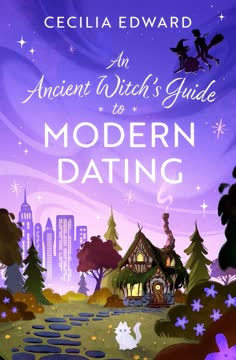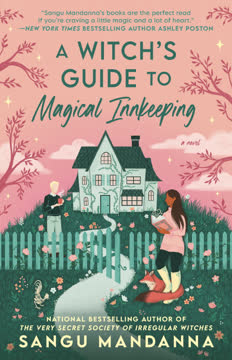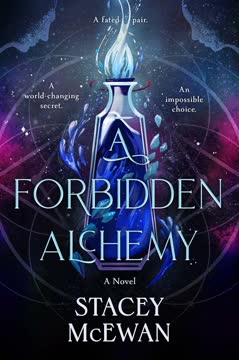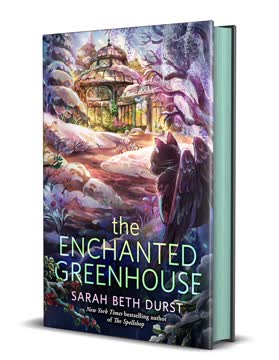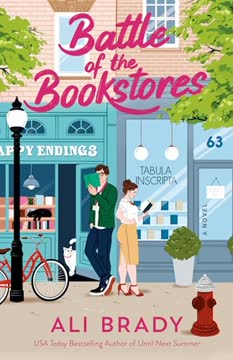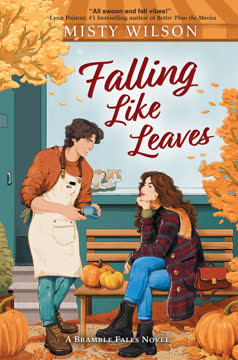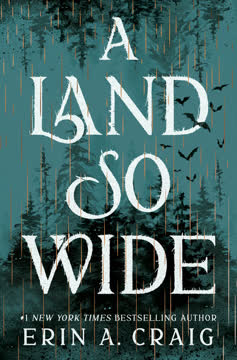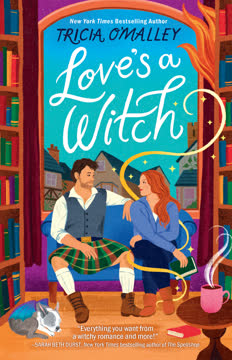Plot Summary
A Most Unsuitable Witch
Thorn Scarhart, a nearly forty-year-old witch, is desperate to find a husband before time runs out. In her small 1690s town, she's considered far past her prime, but with the help of matchmaker Madam Maude and a few magical potions, she attempts to win the heart of the local blacksmith. Despite her efforts, including a True Love potion, the spell unravels, and Thorn is left alone, reminded of her age and her mother's warning that a woman without a man is incomplete. The sting of rejection and the pressure of societal expectations set Thorn on a quest to perfect her mother's elusive Forever True Love potion, hoping magic can fill the void that time and loneliness have left in her life.
Potions, Pining, and Regret
Thorn's attempts at love are haunted by her mother's legacy and her own insecurities. She recalls her childhood, her mother's obsession with love potions, and the tragic loss of her sister Rose. Thorn's life is a cycle of potion-brewing, market days, and solitude, punctuated by the sting of being called a spinster. Her failures in love and magic are intertwined, and she becomes obsessed with improving her True Love potion, convinced that a tweak—perhaps a rare feather—will finally bring her happiness. But her efforts are repeatedly sabotaged by mishaps, interruptions, and the persistent ache of being left behind by time, family, and love.
The Cat Distribution System
Thorn's only constant companion is Bandit, her sarcastic white cat familiar. Their relationship is both comfort and torment, as Bandit's commentary highlights Thorn's loneliness and her failures. The cosmic cat distribution system—a magical explanation for how cats find their witches—serves as a metaphor for fate and the randomness of connection. Thorn's memories of her first familiar, Turnip, and the mysterious disappearance of both her cat and her sister, deepen her sense of abandonment. Yet, Bandit's presence is a reminder that love, in any form, is unpredictable and often arrives when least expected.
A Leap Through Time
In a chaotic accident involving a frog-turned-customer, a vengeful cat, and a spilled cauldron, Thorn accidentally drinks her own experimental potion. Instead of love, she's hurled three centuries into the future, landing in her own cottage—now a historical museum. Disoriented, she's confronted by tourists, modern conveniences, and the realization that everything she knew is gone. The world is brighter, faster, and lonelier. Her magic is unreliable, her potions curdled, and her home is no longer hers. Thorn must navigate a world where witches are curiosities, not threats, and where her old ways no longer guarantee survival or love.
Modern Magic, Modern Loneliness
Thorn struggles to adjust to the twenty-first century, bewildered by technology, fashion, and the casualness of modern relationships. She befriends Meg, the museum's treasurer, and Walls, a gentle veterinarian who can talk to cats. Bandit, ever adaptable, is more interested in modern cat food than existential crises. Thorn's attempts to recreate her potions are stymied by missing ingredients and the extinction of magical creatures. She's forced to confront her own irrelevance and the possibility that love, in this era, is as elusive as ever. Yet, the kindness of strangers and the promise of new beginnings offer a glimmer of hope.
The Witch in the Museum
Thorn becomes the resident witch of the Covenstead museum, performing for tourists and grappling with her place in a world that sees her as a relic. She's both object and subject, watched and watching, as she tries to maintain her dignity and adapt her magic to modern expectations. The museum is a sanctuary and a prison, filled with echoes of her past and the ghosts of her family. Through her performances, she finds a strange sense of belonging, even as she mourns the loss of her old life and the impossibility of returning to it.
Dating Apps and Disasters
Introduced to online dating by Meg, Thorn is both fascinated and horrified by the efficiency and superficiality of modern courtship. She brews a Youth potion to appear younger in her profile, but her efforts are met with ghosting, catfishing, and the realization that love cannot be conjured with filters or spells. Her attempts at honesty—declaring herself a witch—are met with disbelief or ridicule. Thorn's journey through dating apps is a comedy of errors, exposing her vulnerabilities and the universal longing for connection in a world that moves too fast for magic.
Youth in a Bottle
Thorn's obsession with regaining her youth leads her to concoct increasingly complex potions, each with unintended side effects. She shape-shifts into a younger, more attractive version of herself, but finds that even in a perfect body, love remains elusive. Her dates are disasters, her matches fleeting, and her sense of self erodes with each transformation. The pursuit of external perfection only deepens her internal emptiness, and she's forced to confront the truth that love cannot be manufactured or maintained by magic alone.
Ghosts, Frogs, and First Dates
Thorn's magical mishaps escalate, turning rivals into frogs, herself into a giant, and her cottage into a battleground of spells gone awry. Her first modern date ends in disaster, with her being ghosted and left with the bill. The gap between her expectations and reality widens, and she's haunted by the ghosts of her past—her mother, her sister, and her own younger self. The line between comedy and tragedy blurs, as Thorn realizes that magic can't protect her from heartbreak or humiliation.
The Mad Warlock Next Door
Walls, the veterinarian, becomes Thorn's unlikely confidant and ally. His kindness, patience, and ability to understand both cats and witches offer Thorn a new model of love—one based on acceptance rather than enchantment. Their growing friendship is tested by misunderstandings, magical accidents, and the intrusion of the past. Through Walls, Thorn learns to trust, to ask for help, and to believe that she might be worthy of love without potions or pretense. Their bond deepens, hinting at the possibility of something more.
Speed Dating and Spells
Thorn's foray into speed dating is both farce and revelation. Surrounded by other lonely souls, she realizes that everyone is searching for connection, and that magic is no substitute for vulnerability. Her encounters are awkward, her hopes repeatedly dashed, but she begins to see herself through the eyes of others—as someone interesting, desirable, and deserving of happiness. The experience forces her to confront her fears, her desires, and the possibility that love might be found in the most unexpected places.
Sisterhood and Betrayal
The reappearance of Rose, Thorn's long-lost sister, shatters the fragile peace she's built. Rose's betrayal—her attempt to sacrifice Thorn for a love potion—resurfaces, forcing both sisters to confront the pain and resentment that have shaped their lives. Their reunion is fraught with anger, guilt, and the desperate hope for reconciliation. The legacy of their mother's obsession with love and magic looms over them, and Thorn must decide whether to forgive, to fight, or to flee once more.
The True Love Formula
Thorn's quest to perfect the Forever True Love potion reaches its climax. With the help of friends, familiars, and a community of witches, she brews a potion that promises to bring her to her true love. But the true test is not in the brewing, but in the choice: to use magic to secure love, or to risk her heart without it. The potion becomes a symbol of her journey—from desperation to self-acceptance, from loneliness to connection. The answer, she discovers, is not in the cauldron, but in her own courage.
The Price of Magic
Every spell has a cost, and Thorn is forced to reckon with the consequences of her actions—on herself, on those she loves, and on the world around her. The theft of cat lives, the manipulation of emotions, and the temptation to erase pain with magic all come to a head. Thorn must choose between safety and vulnerability, between control and surrender. The price of magic is revealed to be not just ingredients or effort, but the willingness to face the truth and accept the possibility of loss.
The Never Love Again Potion
In the aftermath of heartbreak and betrayal, Thorn is offered the ultimate escape: a potion that will erase her capacity for love and pain. The temptation is strong, but Thorn recognizes that to numb herself is to forfeit the very thing that makes life meaningful. She chooses to feel, to grieve, and to hope, even in the face of uncertainty. The act of refusing the potion is an act of self-love, a declaration that she is willing to risk everything for the chance at real connection.
Facing the Past
Thorn's final confrontation with Rose is both battle and embrace. The sisters relive their shared trauma, acknowledge their mistakes, and begin the slow work of forgiveness. Thorn lets go of the need to fix the past or guarantee the future, choosing instead to be present—to love, to grieve, and to hope. The ghosts of their mother and their childhood are laid to rest, and Thorn emerges with a new sense of wholeness, ready to face whatever comes next.
A Witch's Second Chance
Thorn returns to the twenty-first century, not as a relic or a curiosity, but as a woman who has earned her place in the world. She resumes her role at the Covenstead, reconnects with friends, and opens herself to the possibility of love with Walls. Their relationship, built on trust and mutual respect, is a testament to the power of vulnerability and the magic of ordinary kindness. Thorn's journey comes full circle, as she learns that true love is not found in a potion, but in the willingness to risk, to forgive, and to begin again.
Love Without Potions
Thorn's story ends not with a grand spell or a perfect romance, but with the quiet, everyday magic of connection. Surrounded by friends, familiars, and the man she loves, she celebrates her forty-first birthday with gratitude and hope. The lessons of her journey—about love, loss, and the limits of magic—are woven into the fabric of her new life. Thorn is no longer searching for a potion to make her whole; she has found wholeness in the messy, beautiful, and unpredictable world of real love.
Characters
Thorn Scarhart
Thorn is a complex, deeply human protagonist whose journey is defined by longing, resilience, and self-discovery. Scarred by her mother's obsession with love and her sister's betrayal, Thorn is both fiercely independent and desperately lonely. Her reliance on magic is both a shield and a prison, keeping her from true vulnerability. Over the course of the story, Thorn evolves from a woman obsessed with finding love through potions to someone who learns to risk her heart without guarantees. Her relationships—with Bandit, Walls, Rose, and her community—reveal her capacity for growth, forgiveness, and genuine connection. Thorn's arc is a testament to the power of self-acceptance and the courage to love, even after heartbreak.
Bandit
Bandit is more than a pet; he is Thorn's confidant, critic, and emotional anchor. His dry wit and feline wisdom provide comic relief and sharp insight, often exposing Thorn's blind spots and fears. As a familiar, Bandit embodies the cosmic cat distribution system—a magical force that brings witches and cats together. His loyalty is unwavering, even as he mocks Thorn's follies and failures. Bandit's own journey, including his brushes with danger and his role in time travel, mirrors Thorn's search for belonging. He is a symbol of unconditional love, the kind that persists even when magic fails.
Walls (Dr. Wallace Mileston)
Walls is the embodiment of quiet strength and kindness. His ability to communicate with animals and his patience with Thorn's eccentricities make him an ideal partner, both in magic and in life. Walls's own history of heartbreak and healing parallels Thorn's, and his willingness to accept her—warts, potions, and all—challenges her to believe in her own worth. His relationship with Thorn is built on trust, mutual respect, and a shared love of animals. Walls's presence in the story is a grounding force, offering Thorn (and the reader) a vision of love that is both magical and deeply real.
Rose Scarhart / Lily
Rose is both Thorn's greatest wound and her greatest hope for reconciliation. Her betrayal—attempting to sacrifice Thorn for a love potion—casts a long shadow over both their lives. As Lily in the modern era, she is a shape-shifter, both literally and emotionally, struggling with her own fear of love and heartbreak. Rose's journey is one of guilt, longing, and the desperate desire to avoid pain, even at great cost. Her eventual confrontation with Thorn is a powerful exploration of forgiveness, the complexity of family, and the possibility of healing old wounds.
Madam Maude
Madam Maude is the wise, sometimes exasperated, but always caring matchmaker who guides Thorn through her romantic and magical misadventures. She represents tradition, community, and the voice of experience, often challenging Thorn to look beyond potions and quick fixes. Her own history with Thorn's family adds depth to her role as both mentor and surrogate mother. Madam Maude's interventions are sometimes meddlesome, but always motivated by love and a desire to see Thorn find happiness on her own terms.
Meg Mileston
Meg is the practical, compassionate treasurer of the Historical Society and Walls's sister. She helps Thorn navigate the bewildering realities of the twenty-first century, from technology to dating apps. Meg's own experiences with love, family, and loss make her a sympathetic and supportive friend. Her role as a mother, wife, and community leader grounds the story in the realities of modern life, offering Thorn a model of resilience and adaptation.
Penny / Penny-Pincher
Penny begins as a penny-pinching customer and becomes a literal frog due to Thorn's magic. Her transformation and eventual return to human form provide both humor and insight into the consequences of magic. Penny's own search for love and her willingness to help Thorn (and later, to meddle) make her a memorable and endearing character. Her journey from adversary to ally mirrors Thorn's own path from isolation to community.
Pepper and Pumpkin
These two cats, with their own personalities and quirks, represent the randomness and resilience of life. Their interactions with Bandit, Thorn, and the other characters highlight the theme of the cosmic cat distribution system—the idea that love and connection are often a matter of chance, timing, and a little bit of magic.
Noodle
Noodle is fiercely protective of Walls and skeptical of Thorn, serving as both gatekeeper and judge. Her warnings to Thorn about breaking Walls's heart add a layer of tension and humor to the budding romance. Noodle's eventual acceptance of Thorn is a sign of true progress in the relationship.
The Blacksmith
The blacksmith is Thorn's first failed match, a reminder of the limitations of both magic and matchmaking. His rejection of Thorn is both a catalyst for her journey and a symbol of the societal pressures that shape her choices. His role, though brief, underscores the story's themes of aging, desirability, and the search for belonging.
Plot Devices
Time Travel Potion
The potion that hurls Thorn into the future is both a literal and metaphorical device, forcing her to confront her past, adapt to new realities, and reimagine her identity. The unpredictability of the potion mirrors the unpredictability of love and life, and its repeated use underscores the theme that true change requires both magic and agency.
The True Love Potion
The quest to perfect the True Love potion drives the plot, serving as a symbol of Thorn's longing for control and certainty in matters of the heart. The potion's repeated failures and unintended consequences highlight the dangers of seeking shortcuts to happiness and the importance of authenticity in love.
The Cosmic Cat Distribution System
This whimsical concept serves as both comic relief and a profound metaphor for the ways in which love, friendship, and belonging often arrive unbidden and unplanned. The cats' ability to travel through time and space reflects the story's larger themes of destiny, choice, and the enduring power of companionship.
Shape-Shifting and Youth Potions
Thorn's use of potions to change her appearance and age explores the tension between self-acceptance and the desire to be someone else. The side effects and failures of these potions reinforce the message that true love and happiness cannot be found by erasing or denying one's true self.
Pentagrams, Daggers, and Stolen Lives
The use of pentagrams, enchanted daggers, and the theft of cat lives raise questions about the morality of magic and the consequences of seeking power over others. These devices serve as both plot drivers and ethical dilemmas, forcing Thorn and her community to confront the limits of magic and the importance of consent, sacrifice, and responsibility.
Foreshadowing and Narrative Structure
The novel employs foreshadowing through recurring motifs (the missing grave, the raven, the enchanted mirror) and a non-linear narrative that gradually reveals the truth about Thorn's past, her family, and the nature of love. The structure mirrors Thorn's own journey from confusion to clarity, from longing to acceptance.
Analysis
An Ancient Witch's Guide to Modern Dating is a witty, poignant, and deeply human exploration of love, loss, and the search for belonging across centuries. At its heart, the novel interrogates the myth that love can be manufactured, controlled, or guaranteed—whether by magic, technology, or sheer willpower. Thorn's journey from desperate potion-brewer to self-accepting woman is a powerful allegory for the modern experience of dating, aging, and healing from trauma. The story deftly balances humor and heartbreak, using magical realism to illuminate the universal challenges of vulnerability, forgiveness, and growth. The interplay between past and present, tradition and innovation, highlights the enduring need for connection in a world that is always changing. Ultimately, the novel suggests that true magic lies not in spells or potions, but in the courage to risk one's heart, to embrace imperfection, and to find joy in the messy, unpredictable, and beautiful work of loving and being loved.
Last updated:
Review Summary
An Ancient Witch's Guide to Modern Dating receives mostly positive reviews, praised for its cozy, humorous, and heartwarming story. Readers enjoy the time-travel element, witchy themes, and relatable dating struggles. The protagonist, Thorn, and her cat familiar, Bandit, are particularly well-liked. Some criticize the repetitive mentions of age and simplistic writing, but most find it a delightful, low-stakes romance with magical elements. The book is often recommended for fans of witchy romcoms and cozy fantasy, with many highlighting its perfect timing for autumn reading.
Similar Books
Download PDF
Download EPUB
.epub digital book format is ideal for reading ebooks on phones, tablets, and e-readers.
